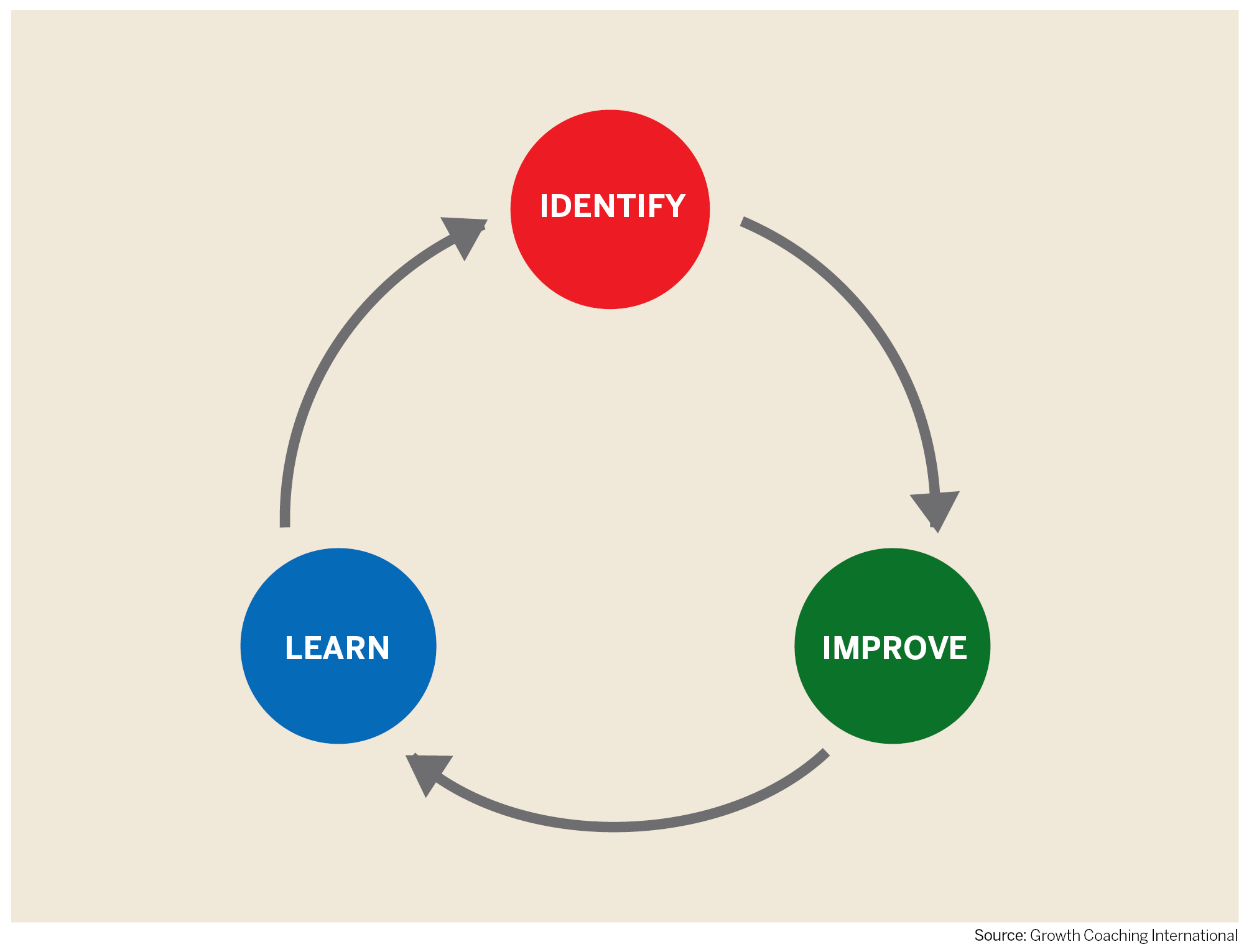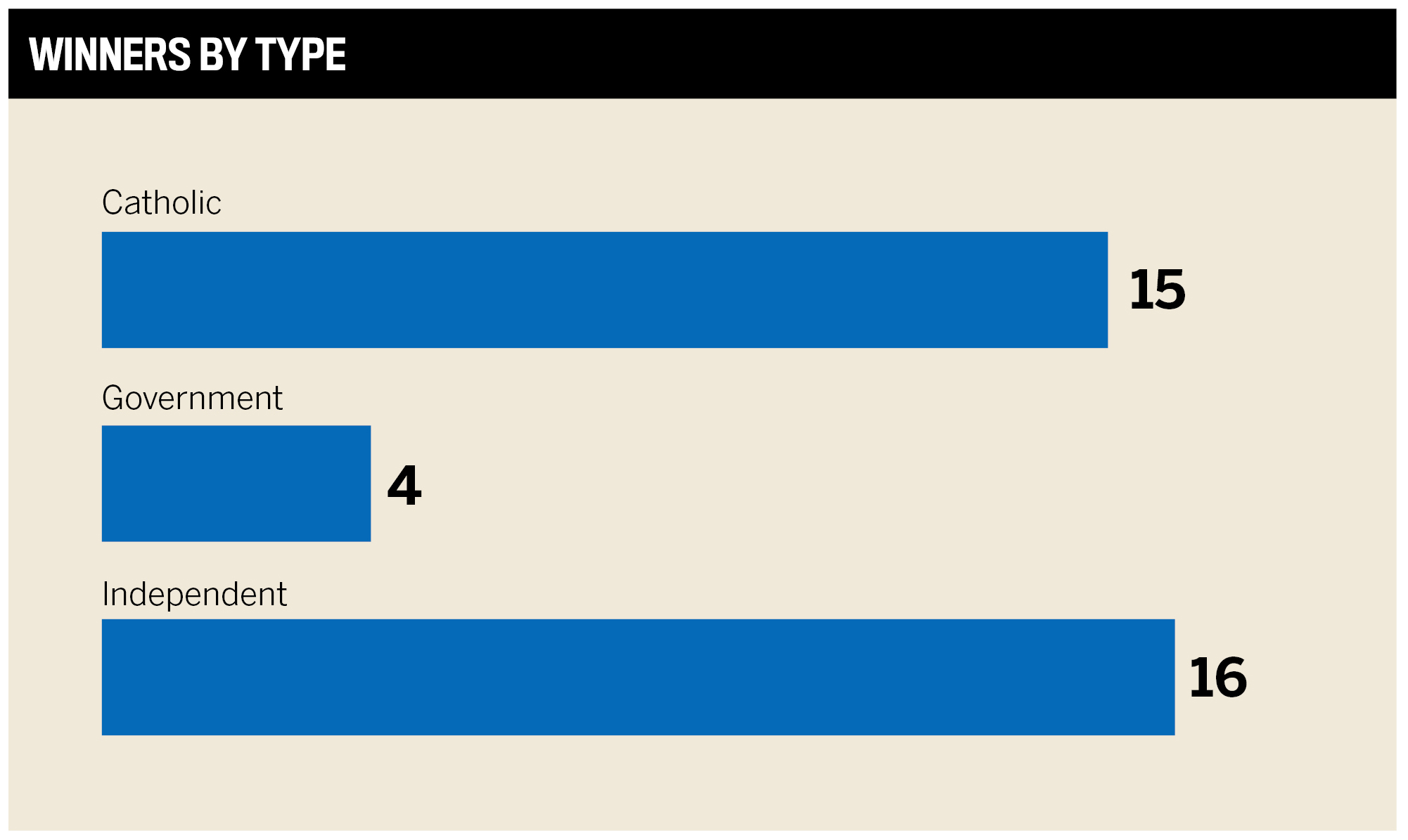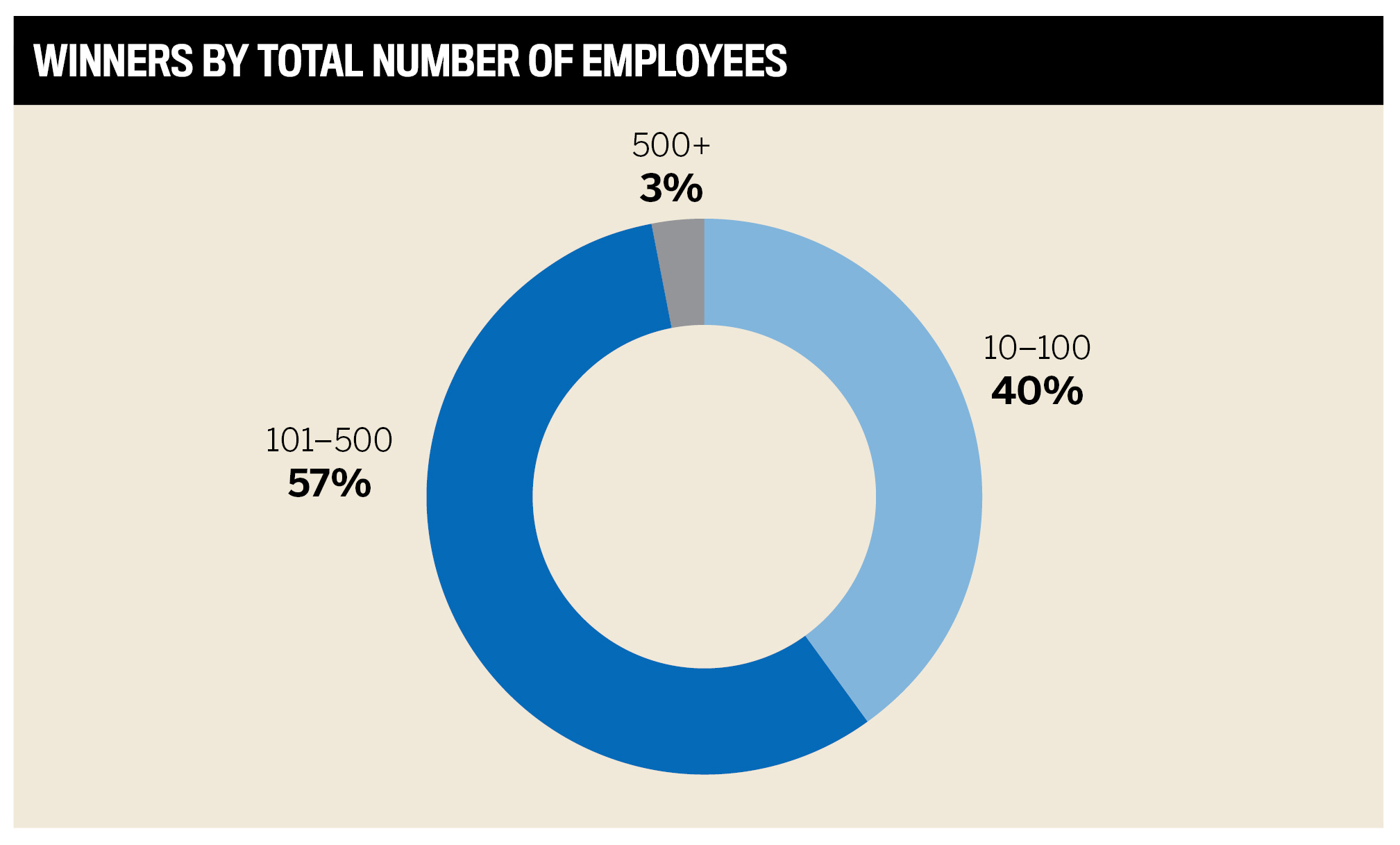Jump to winners | Jump to methodology
Top of the class: culture, care and commitment
In a sector under strain, a cohort of Australian schools is rewriting the script on what it means to be a top employer. These institutions aren’t just ticking boxes – they’re taking deliberate, strategic steps to attract and retain educators in a climate where burnout and attrition are becoming the norm.
They’ve recognised that meeting basic expectations isn’t enough. Instead, they’ve aligned their workforce strategies with what teachers are actually asking for: professional respect, sustainable workloads, strong leadership and a culture of trust.
“Being a top employer isn’t just about perks or pay anymore,” says Tara Staritski, CEO and founder of education consultancy specialist Switch Education. “In the education space, it’s about trust, culture, leadership and how people feel every day.”
That sentiment isn’t just rhetorical. A recent report by the Black Dog Institute paints a sobering picture of the profession’s mental health: nearly half (46.8%) of Australian teachers are considering leaving within the next year. The leading reason is unmanageable workloads, a concern cited by 70% of those surveyed.
These figures are echoed by the federal Department of Education, which warns of a projected shortage of 4,100 teachers by 2025. Compounding the issue are declining enrolments in teacher training programs and high dropout rates – only around 50% of enrolled students are completing their degrees.
Further, the data highlights a troubling trend: approximately one in five new graduates exit the profession within three years, and many seasoned educators are leaving well before reaching retirement age.
With the sector projected to require thousands of new educators by 2030 to meet growing demand and offset retirements, the schools that lead the way will be those that innovate not only in pedagogy but also in people management.
AEU’s data also revealed:
-
51% of principals surveyed said it had become much harder to suitably fill staff vacancies across all areas of the curriculum.
-
Another 30% of principals said it was harder.
-
30% of teachers surveyed said they planned to leave teaching before retirement.
-
Only 15% of teachers were certain that they would not leave.
However, the issue is not just about filling positions – it’s about rethinking what it means to be an attractive, sustainable employer in the Australian education sector. Schools that succeed are investing in supportive leadership, flexible work environments, manageable workloads and a strong, values-driven culture.
Teachers also reported to the AEU that they were finding student management issues increasingly cumbersome, with heavy workloads (68%) and the burden of admin and compliance work (43%) the main reasons for wanting to leave.
Australian Government-commissioned research by Jobs and Skills Australia highlighted a key issue to improve the wellbeing of teachers by stating, “The sector should systematically recognise the role of senior and experienced staff in supporting trainee induction, development, assessment and mentoring.”
While fair pay remains a critical factor, Staritski underscores other key elements that make individuals remain in education:
“We see it all the time – schools and organisations that invest in this do better with staff retention, morale and even student outcomes. They’re not just reacting to problems – they’re building strong foundations proactively,” adds Staritski.
The Educator’s 5-Star Employers of Choice 2025 represent a cohort of schools that have not only acknowledged the mounting pressures facing the workforce but have proactively cultivated supportive environments. They are doing more than crisis-managing and are building reputational capital by embedding wellbeing into the core of their leadership models and redesigning roles to reflect the real-world pressures of teaching today.
These have also demonstrated a strategic commitment to building high-performing, people-centric workplaces. This recognition by TE is based on comprehensive, anonymous employee feedback, measuring key dimensions such as organisational culture, compensation, benefits, professional development opportunities and overall employee satisfaction.
Key trends and insights from the data
1. Top-performing schools have high and consistent ratings across all metrics
-
St Margaret’s Anglican Girls School, John Paul College, and Kolbe Catholic College achieved the highest overall satisfaction scores with impressive average ratings across most categories. These schools showed particularly strong performance in:
2. Workplace culture and wellbeing are critical drivers
-
Schools that scored highly in areas like “I feel valued for my work,” “I am satisfied with the culture of the workplace” and “I am satisfied with work-life balance” also tend to rank higher overall.
-
This underscores a growing trend: pay and benefits are important, but not enough. Staff place increasing value on psychological safety, team morale and day-to-day experiences.
3. Professional development and career progression matter
-
Top scorers invest in structured training programs and provide clear advancement pathways. For instance, St Mary’s School, Geelong and Marsden Park Anglican College had strong metrics in:
4. Schools with larger staff bases face mixed results
-
Patrician Brothers’ College Fairfield and Our Lady of Mt Carmel Catholic Primary School showed greater variation in satisfaction, especially in culture and workload management.
-
Larger institutions may struggle to maintain consistency in leadership quality and culture across departments.
5. Burnout indicators still present in mid- and low-tier schools
-
Lower-scoring schools show dips in metrics related to:
-
These are often the canaries in the coal mine for burnout and attrition issues, reflecting national trends around teacher fatigue and systemic under-resourcing.
Strategic takeaways for school leaders and HR teams
-
Investment in wellbeing, flexible work and cultural cohesion will directly correlate with retention and satisfaction.
-
Recognition and growth opportunities need to be embedded into performance frameworks, not just add-ons.
-
Use employee feedback loops: High performers rely on ongoing, anonymous feedback to inform workplace improvements, as reflected in the survey methodology.
TE’s 5-Star Employers of Choice 2025
As a five-time recipient of Employer of Choice accolades, success hasn’t come from a single transformative initiative, but from a deliberate layering of practices that put people first. In a sector where recruitment and retention pressures show no sign of easing, St Margaret’s Anglican Girls School makes a compelling case for slow-burn, high-impact change, built on trust, care and a genuine investment in the people who make schools work.
“Being a top employer is not about any one big initiative; it’s about many ongoing initiatives – large and small – that have built a culture of care and community,” says principal Ros Curtis, AM.
That ethos underpins the school’s Wellbeing Framework, which treats staff support not as an added benefit, but as a strategic pillar of educational excellence. The thinking is clear: a well-supported team delivers the best outcomes for students.
Recent improvements under a newly negotiated Enterprise Agreement include increases to staff salaries and additional payments for extracurricular commitments – a meaningful recognition of the unseen labour that often comes with the job. Practical measures such as tuition discounts for employees’ children and extra one-day Christmas leave for support staff reinforce the school’s broader commitment to equity and staff wellbeing.


“The school encourages and actively seeks feedback to ensure that staff feel welcome and included, and we will act when feedback tells us otherwise”
Ros Curtis, AMSt Margaret’s Anglican Girls School
In 2024, the school launched its Professional Learning Framework to guide members on their career development and showed its commitment by earmarking:
-
$102,000 for teacher professional learning
-
$42,000 for staff professional learning
-
subsidies for master’s study and a study day per semester
-
over 257 teaching days for enhancements via external providers
The Center for Teaching and Learning Excellence offers several programs open to St. Margaret staff and teachers from other independent south-east Queensland schools. It caters to teachers looking to transition to middle leadership or those in the early years of their careers.
Growth for support staff is also a priority through its own Professional Learning Committee, which helps members match available opportunities with their desired career goals.
“Professional learning can take a variety of forms; however, more importantly, it operates under the premise that all staff, no matter their experience or position, can meaningfully grow in their careers,” adds Curtis.
A workplace that prioritises enabling and driving standards has fuelled Salesian College Sunbury’s ascent to the top. With the Australian education system grappling with retention, workload and morale, this winning school’s approach stands out – not for flashy innovation, but for a sustained, strategic focus on professional growth.
At the heart of its success is a workplace that places a premium on rigour and reflection. “Our whole-school coaching culture empowers all staff by focusing on individual growth, classroom climate and professional reflection,” shares Ammie Franklin, deputy principal for people and culture.
There is a robust coaching program that makes continuous improvement more than a slogan. Grounded in Jim Knight’s The Impact Cycle and delivered in partnership with Growth Coaching International, it embeds coaching into the daily rhythm of school life, offering targeted, evidence-based support for both teachers and leaders.
It’s a model that signals a shift from one-off professional development sessions to something deeper: a systemic commitment to pedagogy and leadership.

Employees can also upgrade their professional experience by taking advantage of over 70 formal leadership roles spanning all areas of school life.
Salesian supports staff to pursue external learning and qualifications by providing:
-
$2,000 per year in financial assistance for nominated sponsored postgraduate study or accredited professional learning
-
5 days paid time release annually
Over the past 12 months, 18 staff have utilised the funded further studies benefit, while more than 170 teaching and support staff have engaged in formal coaching programs.


“Our growth culture is underpinned by the belief that every staff member is a lifelong learner and contributor to student success”
Ammie FranklinSalesian College Sunbury
In addition, there is a commitment to excellence in student management via a whole-school approach to behaviour education. The college has implemented the 4Rs model to deliver clear, consistent expectations for students and empower teachers to manage behaviour effectively:
1. Remind
2. Reset
3. Remove
4. Restore
The Salesian values include presence, joy and care and are implemented by a wellbeing scheme which extends across mental, emotional and professional domains. “With these initiatives, we ensure that all our employees are supported, recognised and empowered to lead the Salesian way,” Franklin says.
Still in its early years, Mickleham Secondary College might be one of the youngest government schools (established in 2023), but it’s already making waves, named an Employer of Choice for the second year running.
For founding principal Lian Davies, the opportunity to build a school from the ground up has been less a challenge and more a rare professional privilege. “Everyone has been so committed and positive,” she says. “They’ve gone the extra mile to build this place the way we want it to be.”
Where others might see uncertainty, Davies sees room for innovation. The school has prioritised culture from day one, not through guesswork, but through data-driven decision-making. Regular, anonymous surveys of staff, students and parents inform everything from professional learning to wellbeing initiatives, anchoring school improvement in real-time feedback.
“We had our school vision to create an inclusive, supportive learning community where people strive to achieve their best,” explains Davies. “That was originally ‘where students strive to achieve their best,’ and we changed it because we felt as staff that we wanted to be included in that as well.”
The school has welcomed several newly graduated and permission-to-teach educators to its team. “We actually have a staff mentor who works with our early years teachers to support them, meet with them and regularly check in on them,” says Davies. “They might not only have that person, but they might also have their domain leader. There’s no judgement; it’s where we all were in those early years of teaching, and we really want to help them be their best.”
Consistent with the nationwide picture, Victoria faces a persistent teacher shortage. According to the Victorian Teacher Supply and Demand Report 2022, the state is projected to be short 5,036 teachers by 2028.


“We want to be a strong, positive workplace where we enjoy being together”
Lian DaviesMickleham Secondary College
Davies acknowledges the challenge, particularly for state-funded schools that struggle to compete with incentives offered by private institutions. However, she remains optimistic and highlights Mickleham’s commitment to professional development.
She says, “We invest in our staff by covering professional development costs, and as a rapidly growing new school, we offer a lot of career opportunities that are seen as incentives for young people wanting to grow in their career path.”
All growth initiatives are organised in a yearly development calendar, including:
-
Inspire Local Leaders Program
-
Create Middle Leaders Program
-
Unlocking Potential Program for staff moving into principal positions
For Davies, the key is enabling staff to develop their expertise, even if that means losing them from Mickleham. “It’s important that they grow as teachers and learners and that we understand sometimes that means that they’ll end up moving on to promoted positions elsewhere. That’s okay, because it’s important for us that they grow as people, and we’ve all benefited from gaining those skills.”
There’s also a range of short courses for staff, such as on finance matters, plus training in first aid, anaphylaxis and CPR. However, overarching everything is an aim to develop and nurture a culture that supports staff, no matter their background or seniority.
Davies adds, “We aspire to be really kind to one another and fun and encouraging. One of the things that was important to us in developing a new school was making it a place that we actually all wanted to come to every day, and not somewhere that we dreaded going to.”
Sheldon College may be a first-time entrant in the Employer of Choice ranks, but its approach is anything but tentative. With a sharp focus on improving workplace conditions and enabling staff to thrive, the school has crafted an employee value proposition (EVP) that wouldn’t be out of place in the corporate world.
“We looked at what leading schools offered, and we also looked external to education – at what an ASX 500 company might provide – to see how we could bring our offer up to that benchmark,” says principal Kate Mortimer.
That ambition has translated into a structured EVP built around five pillars: financial security, health and wellbeing, social connection, family support and professional growth. It’s a comprehensive framework designed not just to attract talent, but to retain and nurture it.
Among its more unexpected innovations is the “Dumb Things We Do” survey, a corporate-inspired initiative that invites staff to anonymously identify inefficiencies and irritations, but also to offer ideas for improvement. “It provides a voice for feedback at every level,” says Mortimer. “It demonstrates that you’re listening and making the right changes to benefit the staff.”
Salary packages exceed EBA benchmarks, but the leadership team is under no illusion about the broader economic pressures staff face. In response, the school has secured corporate partnerships that extend discounts on healthcare, optometry, fitness and retail – practical supports that acknowledge the real cost of living while enhancing everyday wellbeing.
Mortimer believes that no effort is too small when it comes to caring for employees. She says, “Wellbeing isn’t only a program. We have a staff wellness committee and we’re really purposeful around ensuring that our staff are valued in a way that is important to them.”
Sheldon also increased spending on individualised professional development. A broad range of fellowships, scholarships and study subsidies are available for all staff, even the ground and cleaning personnel.


“I’m a principal with a really open mind; I welcome good and bad feedback”
Kate MortimerSheldon College
Deserving staff are recognised through the Values Champion Award, celebrating those who embody the school’s core values, plus the Service Recognition Award, which honours milestones of dedicated service.
Achieving work-life balance specific to the individual is a focus for Mortimer. The school runs a fortnightly pulse survey to stay alert to signs of overworking or feeling under pressure.
“We deliberately track that data, and we can watch people’s attitudes perhaps be impacted in those busier weeks, so we can get ahead of it early and talk about it happening, or we can attempt to adjust the workload for the following year,” she says.
This extends to an understanding of new teachers trying to find their feet in the career and become established. The school waives co-curricular requirements for them.
Mortimer says, “It’s about recognising that people are at different stages in their careers and ensuring that you have a structure and supportive measures in place to help people amplify their performance and to learn regardless of where they are on that continuum.”
Alongside that, onboarding and induction are specific to whether it’s a young teacher or somebody experienced. “We’re able to create elements of a bespoke program that suits and supports a staff member regardless of where they are in their career and then also our growth and learning review cycle is built specifically,” adds Mortimer.
Diversity is another focus at Sheldon, with 42% of its students coming from a non-English speaking background. The concept of inclusion is borne out in the school philosophy – love, laughter and learning.
“I often say to the staff that while every day can’t be fun, there’s something fun in every day. We’re really purposeful at having a good day on purpose, and we make a decision to be optimistic,” explains Mortimer. “Even when you walk around the grounds of Sheldon, there’s an optimism and a desire to be better every day at what we do.”
What the Best Schools in Australia prioritise
Each of TE’s recognised schools is distinct in its approach, but all have demonstrated a dedication to bringing exceptional workplaces to life for their staff.
Education consultant and recruitment expert Staritski leans on the value of genuine psychosocial support in the workplace. She says, “Employees are looking for wellbeing policies that are real, not just posters on the wall. It can include things like mental health support, reasonable workloads and a workplace culture that feels psychologically safe.”
This is encapsulated in St Margaret’s holistic approach towards employee health and wellbeing. Workload and staffing needs are regularly reviewed within key departments. In 2024, to meet the increase in student enrolment, additional staff were recruited for the school’s sports program.
While its bespoke intranet, The Pod, hosts the Staff Wellbeing Hub, a centralised platform where employees have on-demand access to:
-
staff wellbeing initiatives brochure
-
regular wellbeing newsletter
-
employee assistance program (EAP) for free counselling services
-
nomination forms for random acts of kindness, innovation and staff awards
Making school facilities accessible to staff is also part of St Margaret’s wellness campaign. Employees can use the pool and gym. Staff teams are also active in marathons and charity walks like the “Bridge to Brisbane” walk and Walk Against Domestic Violence.
Staff have access to yearly complimentary flu vaccinations and end-of-term massages. The school also boasts a variety of social events that keep the workplace dynamic. Employees can opt to join various activities like:
-
paint a pot
-
cooking classes
-
yoga, mindfulness and sleep workshops
-
annual Melbourne Cup Luncheon
-
end of term drinks and staff celebration
“Workplace culture can take a long time to build and a short time to dismantle,” Curtis shares.

This understanding drives the school’s commitment to wellbeing. “We value and proactively protect our culture through open and honest staff relationships and a whole range of wellbeing initiatives to ensure everyone is nurtured.”
Mickleham is also on a similar course of creating a positive and inclusive workplace. Principal Lian Davies espouses the importance of celebrating colleagues.
Employees can join in social events such as Education Support Staff Day, parent-teacher dinners, winery trips and family barbeques. “They bring their families to see the school so their partners and children can understand where they are working. Having that kind of environment where people feel proud of where they work makes a huge difference to everyone’s attitude,” Davies says.
Staritski cautions on the dangers of tokenistic annual events and adds that when expectations around work-life balance don’t match reality, people burn out fast.
Sheldon takes this to heart and is a strong proponent of work-life balance. The school intentionally tracks staff workload and schedule to avoid overcommunicating around busy weeks. It can be challenging to do, especially for a group that reaches 400 seasonally, but Mortimer shares that it has to be done for staff wellbeing.
“You cannot remove reporting and marking from a teacher’s life, but you can definitely adjust the pressures on either side,” she adds.
To further support employee welfare, the school also offers:
Salesian College takes its wellbeing program to the next level by offering all employees and their immediate families access to a comprehensive EAP, which includes:
-
up to six free confidential counselling sessions per issue, per person
-
24/7 phone and online support
-
financial counselling and legal advice
-
wellbeing and mental health resources
-
manager assist services to help leaders support their teams effectively (promoted during induction, in the staff portal and in ongoing wellbeing communications)
Vice principal Franklin adds, “Our wellbeing strategy reflects our belief that staff must feel safe, seen and supported so they can thrive professionally and personally.”
As Australia’s schools navigate mounting pressure to lift student outcomes, the risk of losing sight of staff wellbeing is all too real. But TE’s Employers of Choice 2025 are leaning into a different question: what does it take to create a workplace where people feel heard and want to stay?
For Staritski, the answer lies in dismantling hierarchy and embedding psychological safety into everyday culture. “Everyone should feel safe to speak up, especially when they’re not coping.”
It’s a philosophy embraced by Salesian College, where staff feedback is not an annual box-tick but a structural feature of how the school functions. Engagement and satisfaction surveys inform coaching, leadership development and review cycles. Importantly, support staff are included in these processes and encouraged to raise concerns in team meetings, with clear pathways to leadership.

St Margaret’s Anglican Girls School takes a more formalised route. The school commissions external consultancy MGM to run a biennial survey measuring sentiment across key dimensions – culture, wellbeing, leadership support and professional development. The latest results speak volumes:
At Mickleham Secondary College, a newer government school, feedback is built into the daily operating rhythm. A combination of open-door leadership, weekly all-staff check-ins and smaller working groups – each led by a vice principal – ensures communication flows both ways. These groups not only support wellbeing and career development but also help spot challenges before they escalate.
Across these leading schools, one principle holds: empowering staff voice isn’t a “nice to have”; it’s a strategic asset and, increasingly, a competitive one.
- Bellbird Park State Secondary College
- Bishop Druitt College
- Catherine McAuley School
- Cobram Secondary College
- Iona College Geelong
- John Paul College
- Kolbe Catholic College
- Our Lady of Mt Carmel Catholic Primary School
- Patrician Brothers’ College Fairfield
- Saint Ignatius’ College Adelaide
- St Brigid’s Primary School
- St John the Baptist Catholic School
- St Mary’s School, Geelong
- St Peter’s Primary
- Star of the Sea
- Templestowe College
- Toowoomba Grammar School
- Unity Grammar
- Warrah Specialist School
To find the educational establishments that have offered the best employee experience in the past year, The Educator first invited schools to participate by filling out an employer form, which asked schools to explain their various offerings and practices. Next, employees from nominated schools were asked to fill out an anonymous form evaluating their workplace on a number of metrics, including benefits, compensation, culture, employee development and commitment to diversity and inclusion.
To be considered, each school had to reach a minimum number of employee responses based on its overall size. Schools that achieved a 75% or greater average satisfaction rating from employees were named 5-Star Employers of Choice for 2025.
The 5-Star Employers of Choice report is proudly supported by the Australian Boarding Schools Association.
The Australian Boarding Schools’ Association (ABSA) is the leading authority in Australia, New Zealand and Asia on boarding for school-aged children. As such, it promotes the interests and wellbeing of boarders, boarding staff, boarding parents and boarding institutions. It fosters collegiality and professionalism at a regional and national level. ABSA continues to advance the profile of boarding and best practice in boarding and facilitates communication on boarding matters between schools, hostels, educational bodies and governments.
The mission of the association has been encapsulated in the following statement: The ABSA exists to promote the interests of boarding schools by enhancing the wellbeing of boarders, facilitating the professional development of staff and advancing excellent practice among schools.
ABSA’s collective ambition is to provide strategic leadership for the boarding profession to ensure excellent practice through deeper engagement of members with the association.


